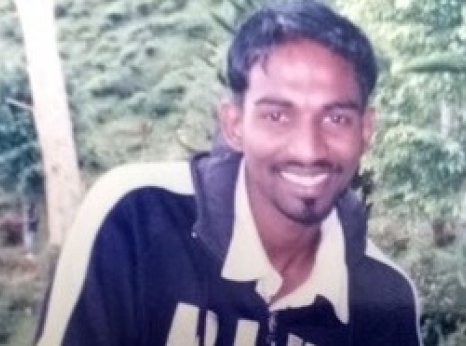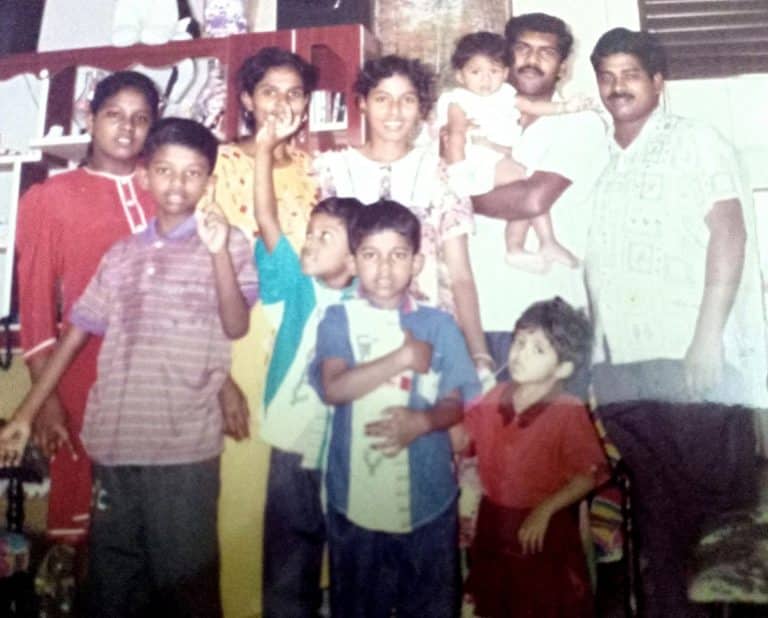
Handcuffs, shackles, chains, black veils,
Pannir Selvam Pranthaman, 2022
Trapdoors, lethal chambers, executioners,
Devotedly sing a murderous chorus,
As if cheering for evil to take its form.
Pannir Selvam Pranthaman wrote the lines quoted above in a poem entitled ‘Death Row Literature’, which he dedicated to Nagaenthran K Dharmalingam, a fellow death row prisoner and close friend he had to say goodbye to in April 2022.
Pannir, the third out of six children in a family from Ipoh, Malaysia, refuses to let imprisonment on death row rob him of his creativity. Since he was sentenced to death in May 2017, he has written bravely and extensively, producing poetry, songs and letters for his family and the wider public. In these works, he shares his reflections on society, justice, human nature and capital punishment.
The early years

Pannir’s family was close-knit but struggled financially. His father, a lorry driver and a church pastor, struggled to make ends meet for a family of eight. Pannir stopped studying after secondary school to work and supplement the household income, starting as a warehouse assistant. He moved to Singapore in 2010 in the hopes of gaining more work experience and expanding his horizons.
He landed a job as a private security officer and regularly sent money home to pay for his younger sister’s tertiary education. However, in the four years that he was working so far away from home, Pannir was only able to visit his family twice.
In September 2014, Pannir was arrested at Woodlands Checkpoint after drugs were found in his possession. He was charged with trafficking 51.84g of heroin and eventually sentenced to the mandatory death penalty in 2017.
A last-minute reprieve
In 2019, Pannir’s older sister, Sangkari, received the bad news that his execution had been scheduled for 24 May 2019. She was sent the execution notice and a letter informing her that Pannir’s appeal for presidential clemency had failed on the same day. This became the basis of a legal application, arguing that Pannir had not been given sufficient time to seek legal advice on whether it would be possible to challenge the clemency rejection. The Court of Appeal granted him a stay of execution on 23 May, just one day before he was due to go to the gallows, so that he could file an application to challenge his scheduled execution.
Couriers and cooperation
Under Singapore’s Misuse of Drugs Act, anyone found guilty of trafficking more than 15g of heroin will receive the mandatory death penalty. The only way to escape the gallows in such a scenario would be to meet some very specific criteria: the accused person must have only been a courier—that is, merely transporting drugs from one place to another—and also receive a Certificate of Substantive Assistance (CSA), or be found to be suffering from an “abnormality of mind” that affected their “mental responsibility” at the time of the offence.
Pannir was found to have been a courier but could not be spared the mandatory death penalty because the prosecution refused to issue him a CSA. It was not disputed that Pannir had given investigators information about the person he was supposed to deliver drugs to in various statements taken before the conclusion of his trial. However, the Central Narcotics Bureau said that what Pannir had told them “was not new information, was not useful to the CNB, and was not used or relied on by the CNB to arrest Zamri [who had used the name “Jimmy” for these transactions] on 14 October 2014”. Although Pannir’s lawyer argued that, in deciding whether or not to issue a CSA, the prosecution should have considered whether the information that he’d shared was reliable or “of inherent practical value in disrupting drug trafficking activities”, the Court of Appeal disagreed and ruled that “in the context of information provided by an accused person to the CNB, it is not sufficient for the purposes of s 33B(2)(b) of the MDA that the information was inherently capable of being useful; such information must have sebenarnya been used by the CNB in disrupting drug trafficking activities within or outside Singapore”. With this appeal dismissed, Pannir remained on death row.
Fighting in the courts
Pannir has spent much of his years on death row reading and studying the law, thinking about ways to fight the death penalty not just for himself but also for his fellow prisoners. He has been party to multiple joint legal applications, and family members tell TJC that Pannir has often been trusted to read and review legal applications for other death row prisoners.
Save Pannir
While Pannir does all he can to fight the death penalty regime from behind bars, his family has swung into action to campaign tirelessly for him, especially in their home country of Malaysia. With Pannir’s encouragement, they set up Sebaran Kasih, an NGO that works with marginalised and vulnerable communities. His sisters, Sangkari and Angelia, have also been at the forefront of public advocacy, giving media interviews and speaking at events. They have also worked with Malaysian musicians to turn Pannir’s lyrics into songs with music videos that can attract attention and reach a wider audience.
Both Pannir and his family try their best to assist and stand in solidarity with all other death row prisoners. It is hugely difficult undertaking, but they’ve never lost heart, working to engage the public in both Singapore and Malaysia to advocate for the abolition of the death penalty in both countries.
